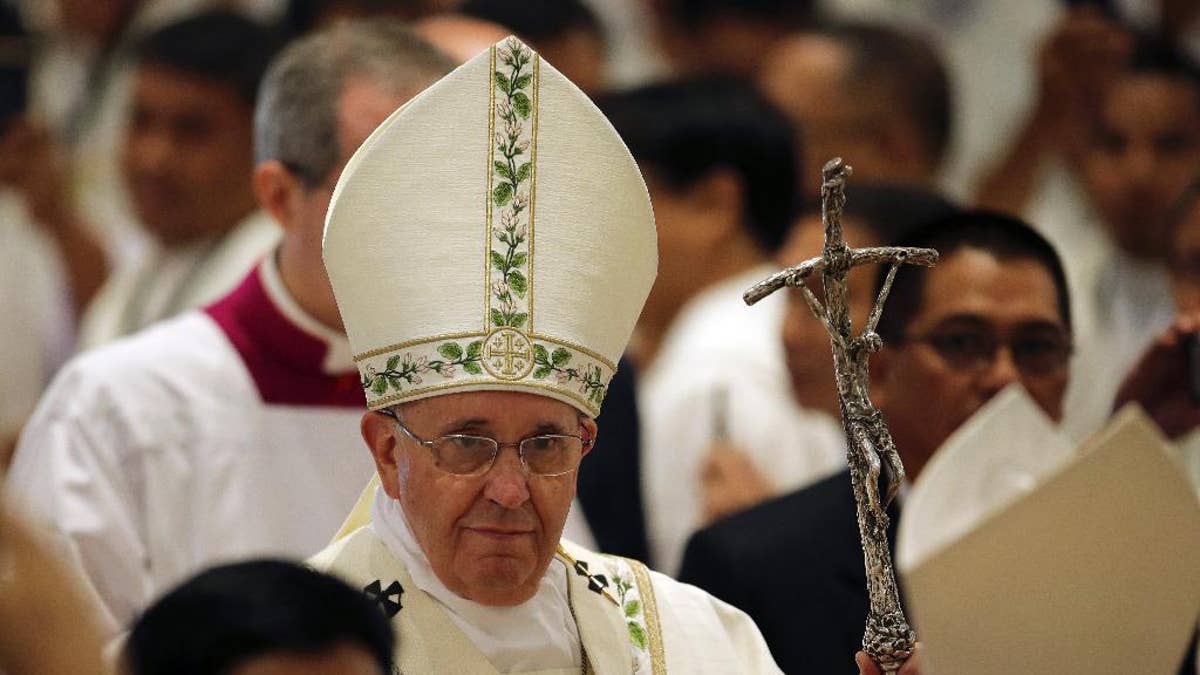
Pope Francis arrives for a Mass for the clergy and religious at the Cathedral Basilica of the Immaculate Conception during his visit in Manila, Philippines on Friday, Jan. 16, 2015. (AP Photo/Aaron Favila) (The Associated Press)
MANILA, Philippines – What ever happened to "turning the other cheek?"
Pope Francis made headlines when he said en route to the Philippines that there were limits to free speech, especially when it ridicules or insults someone's faith. But he raised even more eyebrows when he explained his point by saying that if a good friend cursed out his mother he could "expect a punch" in return.
The Vatican quickly insisted that Francis was by no means justifying the terrorist attack against the satirical French magazine Charlie Hebdo, which had published inflammatory cartoons of the Prophet Muhammad. And Francis, who has condemned all violence committed in God's name, stressed that the attacks were an "aberration."
But his response did pose the question about Jesus' famous exhortation to his disciples in the Sermon on the Mount — and whether for a pope of Italian origin, turning the other cheek only goes so far when the matter concerns his beloved "Mamma."
"Obviously he wasn't justifying violence," the Vatican spokesman, the Rev. Federico Lombardi, said Friday. "He spoke about a spontaneous reaction that you can have when you feel profoundly offended. In this sense, your right to be respected has been put in question."
The Rev. Robert Gahl, a moral theologian at Rome's Pontifical Holy Cross University, noted that Francis didn't say that HE would have punched his friend for insulting his mother. He said his friend could expect to be punched, given that he should know that he had crossed a moral line in lobbing the insult and should be more careful and courteous in not causing offense.
"The pope is not going to hit somebody back," Gahl said. "It's presupposed that a pope, who is supposed to impersonate Jesus, ought not to use violence."
But does that mean Francis should have turned the other cheek as Jesus taught and let the insult go?
Not necessarily. Gahl explained that while Jesus did indeed urge his disciples to turn the other cheek, he did so to teach them a new way of responding to provocations that until then had been met with a retaliatory "eye for an eye, tooth for a tooth." Gahl noted that Jesus fully defended himself — using reason and the law — when he was attacked by his Roman inquisitors.
"Certainly the Catholic Church has never accepted passivism," Gahl said, noting that Christians are allowed to be police officers and soldiers and are encouraged to defend themselves, albeit without resorting to violent retaliation.
"The proper response of the Christian goes beyond turning the other cheek, which is an invitation to hit me again. The Christian response is more complex," he said.
Lombardi, an Italian Jesuit, said he understood why Francis used the example of his mother to make his point, an apparent reference to the tendency of Italian men to remain attached at the hip to their mothers well into adulthood, and forever defensive of their perfection.
Francis has spoken frequently and reverently about the role his mother, and even more his grandmother, played in his life growing up as the eldest of five children in Buenos Aires. He has said his mother taught him about opera and how to cook, after she became bedridden following the birth of one of his siblings. His grandmother Rosa taught him to pray and to this day he carries in his worn breviary, or prayer book, a copy of a creed she composed when he was young.
"He used the classic example that comes to mind to all of us: to not speak ill about our mothers," Lombardi said laughing. "Apparently it's also like that in Argentina."
___
Follow Nicole Winfield on Twitter at twitter.com/nwinfield
